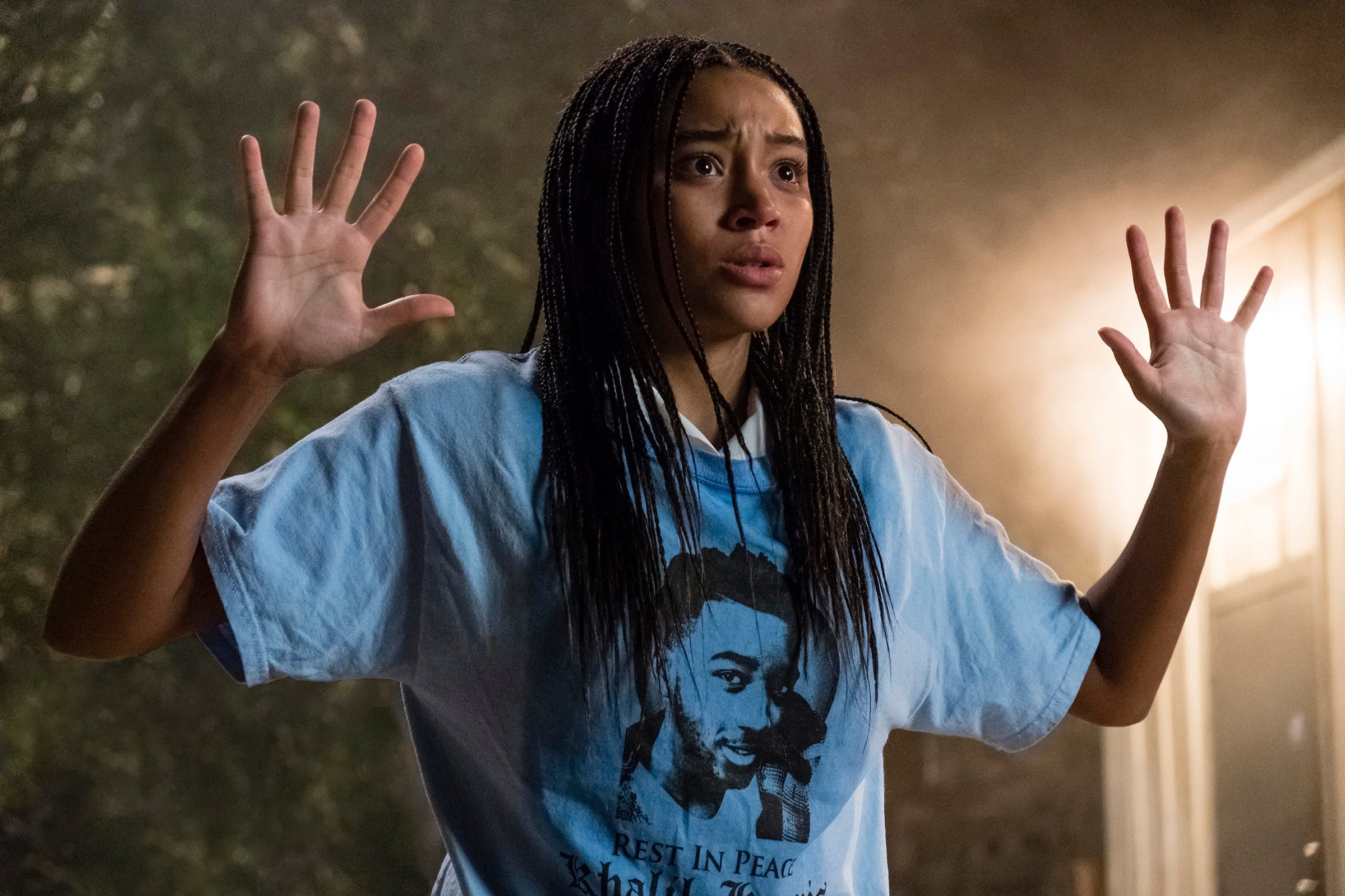
Twice while watching The Hate U Give, the marvelous and provocative film that director George Tillman Jr., has made from Angie Thomas’s 2017 young-adult novel, my throat closed tight with fear. The movie shows two distinct encounters between white cops and black men—with women involved as bystanders—and both times, I braced myself for the worst. I’m a white woman who has no reason to fear a cop if I’m just going about my daily business. But in the past five years or so, the ascendance of cellphone videos showing black men suffering unprovoked violence—or murder—at the hands of white cops has changed the way I see things. These events don’t occur just once in a while, as many of us might have previously thought. They happen every day. I don’t mean that as self-congratulation—let’s think of it as evolution. The best way to understand what other people’s lives are like is to listen, and to see.
The Hate U Give pours that idea into the shape of an engaging story, with a charismatic young performer at its center: Amandla Stenberg plays Starr Carter, a young woman of color who goes to a fancy, nearly all-white private school far from the neighborhood in which she lives, Garden Heights. The local public high school, she explains in an early voiceover, “is where you go to get jumped, high or pregnant.” Her mother, Lisa (Regina Hall), wants to keep Starr and her two younger siblings far away from all that. Starr traverses these two worlds with relative ease: At school, she fits in perfectly with the white kids, becoming a version of herself she calls Starr Version 2. She even has a white boyfriend, Chris (K.J. Apa), who, despite being occasionally clueless, is still a genuinely smart, sensitive kid. But at home, she’s just Starr, at ease with her neighborhood friends in a way she can’t be with her school friends.
You could make a whole movie, probably a pretty good one, riffing on that one complication. The Hate U Give starts out as a culture-clash story, maybe even a romantic comedy, about a young black woman navigating a world where white kids—most of them with money—think nothing of rattling off black slang just because they think it’s cool. Even Starr’s boyfriend Chris does it, though at least he’s self-aware enough to make a joke out of it. But The Hate U Give goes far beyond that basic premise, beginning as one movie and ending up another—that’s not a liability, but a plus.
The action shifts when Starr reunites with an old friend from the neighborhood, Kahlil (Algee Smith), whom she hasn’t seen for a while. It’s clear the two have mutual crushes on one another, but Starr is true to her boyfriend. And then, as Kahlil is driving Starr home from a house party—he whisks her away after a fight breaks out—he’s stopped by a belligerent white cop. Starr knows just what to do: She and her siblings have been schooled by their father, Maverick (Russell Hornsby), a guy who has turned his life around after serving a prison sentence. If they’re confronted by a cop, they must respectfully comply, keeping their hands in sight at all times—though Maverick presents this tactic as a matter of pride and survival, not of subservience. His children must feel no shame about who they are or where they come from—but it’s imperative that they stay alive.
Kahlil hasn’t been schooled in the same way: He’s painfully trusting in his assumption that, since he hasn’t done anything wrong, everything will be OK. But everything is not OK in this scenario, or in the greater world we live in. The rest of the movie details Starr’s reckoning with that fact; her path is fraught with wrenching decisions and outright danger.
There’s enough story in The Hate U Give to fill three movies, yet I can’t think of a thing I’d cut. And the movie’s numerous plot threads allow room for lots of fine supporting actors, among them Issa Rae, Anthony Mackie and Common. (The script was adapted by the late Audrey Wells, director of the 1999 indie hit Guinevere.) Each turn the film takes feels right and necessary, and Stenberg’s Starr is so radiantly self-possessed that it hurts to see her facing life-and-death quandaries no kid should ever have to deal with. Thomas’s book title is derived from THUG LIFE, not just the name of the late Tupac Shakur’s group and the album they recorded, but an acronym for a philosophy: The letters, Tupac explained, stand for “The Hate U Give Little Infants F—s Everybody,” meaning that allowing our children to be subject to violence and hatred only intensifies the cycle, making it harder to break. The Hate U Give explores and expands on that idea: It’s so gripping to watch—as well as being, in places, just delightfully funny—that you never feel you’re being preached to. It picks you up in one place and sets you down in another. But always, you’re in America, where we have no moral choice but to find a way to make it all work.
More Must-Reads from TIME
- Donald Trump Is TIME's 2024 Person of the Year
- Why We Chose Trump as Person of the Year
- Is Intermittent Fasting Good or Bad for You?
- The 100 Must-Read Books of 2024
- The 20 Best Christmas TV Episodes
- Column: If Optimism Feels Ridiculous Now, Try Hope
- The Future of Climate Action Is Trade Policy
- Merle Bombardieri Is Helping People Make the Baby Decision
Contact us at letters@time.com